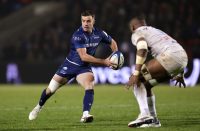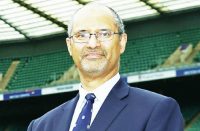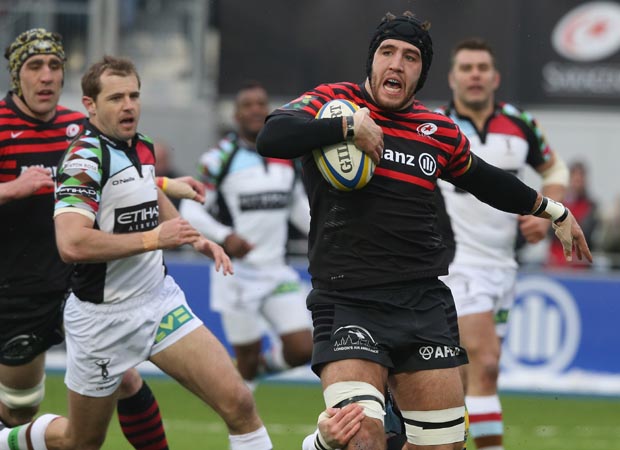 Will Fraser faces a new start this season, and one of the main yardsticks by which the Saracens No.7 and most of his England squad rivals will be measured is how they do in the Northern Hemisphere’s paramount club tournament, the new leaner, meaner European Champions Cup.
Will Fraser faces a new start this season, and one of the main yardsticks by which the Saracens No.7 and most of his England squad rivals will be measured is how they do in the Northern Hemisphere’s paramount club tournament, the new leaner, meaner European Champions Cup.
The competition, created after the refusal of the English and French clubs to continue competing in the Heineken Cup due to long-standing disagreements with the Welsh and Irish unions over its funding and format, was eventually resolved in April. The do-or-die element to the Champions Cup was highlighted in Thursday’s fixture release with Saracens facing two teams with giant European reputations and aspirations in Clermont, who they play at Allianz Park in Round 1, and Munster who they meet at Thomond Park in Round 2.
Yet, despite the harshness of the immediate terrain, Fraser treasures European competition, and, along with the rest of rugby lovers in these parts, the 25-year-old Saracens openside was delighted when the European Champions Cup deal was concluded. He knew the streamlined 20-team tournament would provide him with the stage to press his case for international honours after an injury-ravaged year in which he has battled back first from tearing shoulder tendons off the bone against Gloucester in April 2013, and then a badly broken left leg sustained against Sale six weeks into his comeback, in December 2013.
It was also because it gives Fraser and his Saracens team-mates a new beginning. They have no reason to mourn the passing of the old tournament because its final salvo, the 19th Heineken Cup final, ended with a multinational Toulon side mortally wounding Sarries’ hopes of achieving an extraordinary European and English double.
With Jonny Wilkinson signing off his career in finest field-marshal fashion for Toulon – who went on to achieve a French double – Saracens were outmanoeuvred and outplayed at the Millennium Stadium, going down 23-6. To make matters worse, a week later a season that had promised so much finished with them leaving
Twickenham empty-handed after a controversial try in the last minute of extra-time saw them pipped to the post, 24-20, by Northampton in an epic Premiership final.
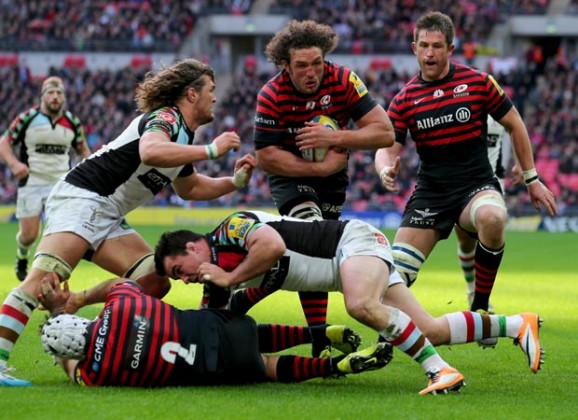
Fraser, fit again but not yet match-fit, watched in dismay as the double crashed and burned. However, he says that a stronger Saracens are emerging from the wreckage.
“The buzz around the club at the end of last season was like nothing I’ve experienced, and I desperately wanted to be involved. To get to two finals was brilliant, especially after getting to two semi-finals the previous season, and the big lift overall was that we scored a hatful of tries and played a game that suited us.”
He adds, “The two finals were very different. After losing the Heineken Cup the boys were devastated, but they had to put it behind them very quickly because there was a chance to put right the hurt almost immediately by winning the Premiership final.”
Fraser reflects: “In hindsight, you can stomach the Heineken Cup loss more, because Toulon took their chances better and deserved to win. The Premiership final was different. From the neutral point of view it was a great game, a great spectacle, but not for us. For Saracens it was gut-wrenching.”
He says his team-mates responded differently. “You get different types in a squad, some who accept it quickly and move on, and others who have to watch it back time after time before they come to terms with it. Then there are others in the middle. It was a weird one for me – because I played so little last season it was more a sense of disappointment for the lads who had worked so hard.
“After those two finals I felt gutted, so I cannot imagine how the boys felt. We did not meet up again after the Premiership final, and in the off-season I made a point of forgetting about it and enjoying my time away. Then, when we met up again for the pre-season, we went through it.”
Fraser talks of a stubborn resolve in the Saracens ranks: “The way we handled it was not to over-react. Our attitude was, don’t panic. Don’t change for the sake of change, just because of the disappointment. Some clubs change players and change game-plan as if it’s going out of fashion when things go wrong, but we said that to change now would be a travesty after what we have strived for for the last five years.”
He says that does not make them blind to the need to improve. “It would be very ignorant to go through games like that and not learn lessons. There are areas where we know we could have done things better, particularly in the Premiership final where we missed opportunities and didn’t get our shape quickly enough. However, it is more like little tweaks than a huge re-boot.”
Fraser says that the European Champions Cup structure means every game in every group is hard. “There was no Mickey Mouse stuff before, but there were one or two easier games in some pools, but now that’s over. It’s all quality teams. For instance, we have to go and win at two unbelievable away grounds with Munster and Clermont in our pool. On top of that Sale are not an easy team.”
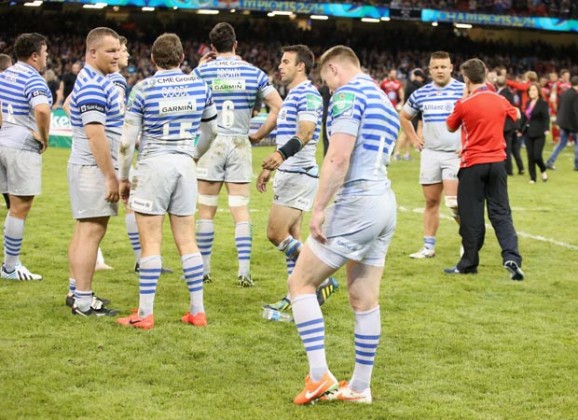
He adds: “The Premiership is a very tough league, but if you lose this week then next week you have a chance to put it right. In the European Champions Cup you have to take your chance or it’s gone – and if you lose two European games you’re almost certainly out. You are playing different opposition, and often in unbelievably hostile grounds like Thomond Park and Stade Marcel Michelin.”
Fraser was at his rumbustious best two seasons ago in getting Saracens to the 2013 semi-finals after finishing ahead of Munster in their pool, and then beating Ulster conclusively in the quarter-finals, before injury ruled him out of the semi-final loss to Toulon (orchestrated, again, by Wilkinson).
It put Fraser on Stuart Lancaster‘s radar, and he has never left it judging by the England head coach’s decision to include the uncapped flanker in the England elite squad called to Loughborough University last weekend to attend the first gathering of the new season.
Fraser can’t wait to get back into European action. “They are games which international coaches take a keen interest in because opponents are less familiar and pose different challenges. It gives them a chance to look at your adaptability and versatility, and whether you can perform at a different level.”
He continues, “You have to go to these places, and you have to get a result. The reason we got out of the pool in first place two seasons ago was because we went to Munster and got a losing bonus point before winning the second of the back-to-back pool games at Vicarage Road. That’s why when you get to a European weekend there is a huge buzz around the club.”
Fraser says Saracens go into the European Champions Cup with a no-fear mentality, and suggests that anyone who thinks their confidence has been knocked sideways by last season’s double-trouble could be in for a nasty shock.
“I believe 100 percent that Saracens can match these big French clubs again. The competition is even fiercer this time, but getting to two back-to-back finals after a very arduous season gives us a huge amount of confidence to take into this campaign. We’ve shown over the last two years that we are a top European team, and we know we can go anywhere and get a result.”
Fraser says that from a personal viewpoint he is ready for the openside fray. “I’m feeling great – I’m 107kg (16st 11 lbs), and that’s my fighting weight. I’m no slouch, but while some are quicker than me, my collision work is a strength whether in defence or attack. I also believe that when it comes to decision-making at breakdown time – reading when to go in and then winning turnovers or penalties, or just slowing the ball down – I’m improving all the time.”
He is also a strong exponent of the need for No.7 specialists: “I’m biased when it comes to talking about the benefits of having out-and-out 7s. It’s not so much the amount of turnovers an openside wins as when he wins them. These days lots of guys in lots of positions compete for breakdown ball, but a real 7 picks his breakdowns for maximum impact.”‘
However, while Fraser acknowledges that he has fierce competition from Jacques Burger, he says they can work well together. “Jacques is a very different openside to me, especially in terms of his work in defence, which is extraordinary. Much of it is down to his ability to read the play so well, as well as great timing. It’s been brilliant for me to learn off Jacques.”
If dynamism is what Burger brings to the Saracens defence, it is what England are looking for everywhere on the pitch according to Fraser.
“At Loughborough the coaches talked to us about the high-tempo game they want England to play. They showed us that the amount of running you have to do at Test level is much more than in the Premiership, and the work that we did in training was in line with that. I like doing ball-work because when they go down that route I feel comfortable. Harlequins and Northampton have gone towards a faster paced game, and Saracens have also been going that way – but, even so, most Premiership matches are not played at Test match tempo.”
Fraser adds: “The figures are higher than I thought they would be in terms of amount of time the ball is in play at Test level, and also the amount of metres run per minute is noticeably more. But it is 100 percent do-able.”
Fraser’s impact may have been delayed by injuries, but for a flanker imbued with the attitude that positive thinking can move mountains, shifting a few bodies at breakdowns is not such a tall order.
*This article was first published in The Rugby Paper on August 17.


